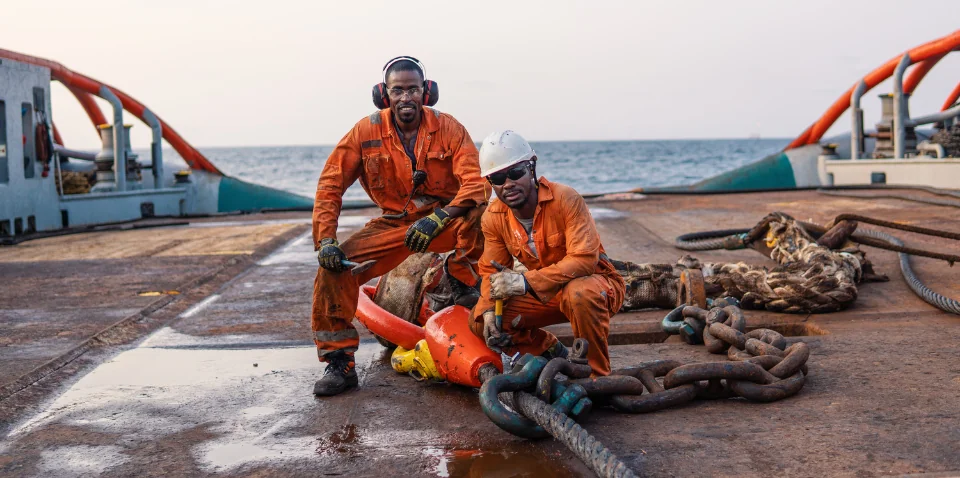Who Qualifies as a Seaman in Maritime Lawsuits?

For more than a century, Louisiana’s economy has been dominated by the shipping, import-export, and oil and gas industries. These maritime industries provide thousands of people with employment in and around LA, and they truly have molded the state’s economic, social, political, and environmental landscape for a very long time.
Most people working in the maritime industry are considered seamen. If you’re a seaman that has been injured, you can count on Gordon McKernan Injury Attorneys to have your back, whether your case falls under the Jones Act, Death on the High Seas Act, Longshore & Harbor Workers’ Compensation Act, or other maritime statutes. We have been practicing offshore maritime injury law in Louisiana for many years!
What is a Seaman?
A seaman is a term that appeared in the 18th century to define a person with significant experience at sea. Today, a seaman is legally defined under maritime law as someone who is a captain or other crew member aboard a vessel in navigation. This means the boat or ship is afloat, operational, and capable of movement.
In legal terms, an “able seaman” is typically someone who spends a significant amount of their work time on a vessel. The specific amount of time required depends on the case, but generally, seamen must work at least 30% of their time on a vessel, though this can vary. Seamen can also include temporary or part-time workers on ships if they meet the required qualifications.
What Does a Seaman Do?
Seamen are classified by their job level. Under the Jones Act, anyone employed on a vessel is generally considered a seaman. However, other maritime roles may classify workers differently based on their duties, such as:
- Captain – Also known as the master, responsible for everything on board.
- Able Seaman – Handles deck duties like painting, cargo stowage, lookout, and rigging.
- Ordinary Seaman – Assists the able seaman in various tasks.
- Boatswain – A senior crew member overseeing cargo maintenance and vessel preparation.
- Quartermaster – Responsible for the bridge, and standing a gangway watch when the vessel is in port.
- Carpenter (Chips) – Mechanic responsible for vessel condition.
- First or Chief Mate – Handles ship maintenance, cargo stowage, and deck responsibilities during docking.
In many cases, a seaman’s role helps define whether they are eligible for compensation under maritime law.
How Does Maritime Law Differ from Other Types of Law?
Injury claims involving ships are much more complex, as they fall under maritime law, which has distinct court systems, regulations, and legislation compared to other injury law fields. The Jones Act, Longshore and Harbor Workers’ Compensation Act (LHWCA), and Death on the High Seas Act (DOHSA) provide protections for maritime workers.
To qualify for compensation under the Jones Act, a seaman must work at least 30% of the time on a vessel. If someone is not covered by the Jones Act, they may still be eligible for workers’ compensation under the LHWCA, which provides benefits for maritime injuries handled through employer insurance or the Department of Labor.
Who Qualifies as a Seaman Under Maritime Laws?
Seaman status is crucial to determining eligibility for maritime lawsuits. To qualify, one must typically meet the following criteria:
- Work on a Vessel in Navigation: The vessel must be operational and capable of movement.
- Job Duties: The worker must spend a significant portion of their workday engaged in duties related to the vessel.
- Minimum Experience: Generally, seamen must have at least 30% of their work on the vessel, though some exceptions exist for temporary or part-time workers.
A seaman may also lose their status if their work shifts to land-based duties or if they no longer spend the necessary time working on a vessel. This is important, as seaman status influences both compensation under the Jones Act and eligibility for legal claims.
Common Misconceptions About Seaman Status
There are often misconceptions about who qualifies as a seaman, especially regarding temporary or part-time workers. Some may believe that workers not constantly aboard a vessel aren’t entitled to compensation.
However, under maritime law, part-time workers who spend substantial time on a vessel may still be classified as seamen. Courts will examine a worker’s duties and responsibilities to assess eligibility.
Maritime Injury Claims for Seamen
Injuries sustained at sea can vary widely, and maritime laws are designed to protect workers. For example, the Jones Act allows seamen who have been injured in the course of their duties to file personal injury lawsuits against their employers. Maritime injuries can include serious accidents like:
- Falls
- Machinery malfunctions
- Incidents caused by inadequate safety equipment
Understanding whether you qualify as a seaman can directly impact your ability to file a maritime injury claim and receive compensation.
Learn Your Rights & Options Following a Maritime Injury
Louisiana Maritime Injury Lawyer Near Me
Injuries sustained at sea are often complicated by unique laws and circumstances. If you’re a seaman involved in an injury, legal representation is essential to ensure your rights are protected. Gordon McKernan Injury Attorneys specializes in maritime law and can assist you in navigating complex legal processes.
For a free consultation and legal options related to your case, contact us at . You owe us nothing if we don’t win your case!

Office Locations
Denham Springs Office
163 Del Orleans Ave., Denham Springs, LA 70726
Gonzales Office
220 S. Burnside Ave. Gonzales, LA 70737
New Orleans Office
4241 Veterans Memorial Blvd, Suite 15 Metairie, LA 70006
Zachary Office
4361 Main St. Zachary, LA 70791
© 2025 Gordon McKernan Injury Attorneys.












